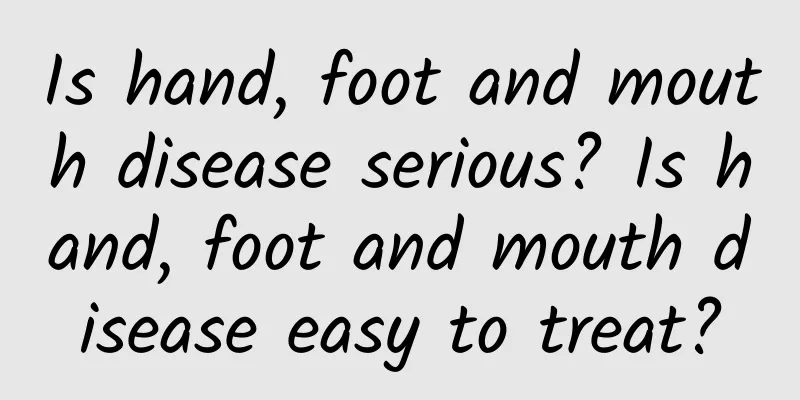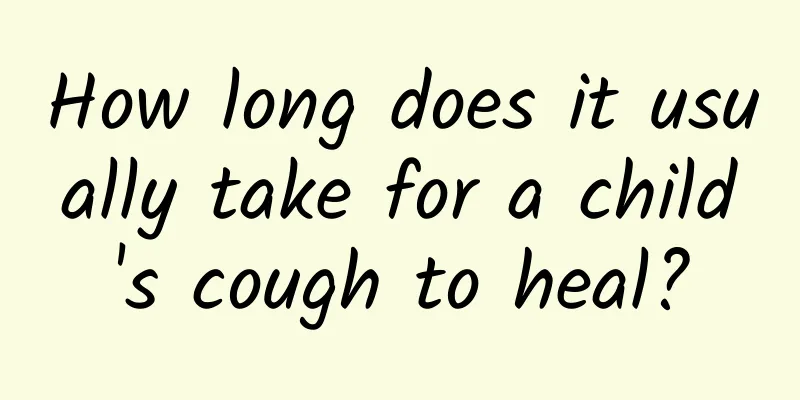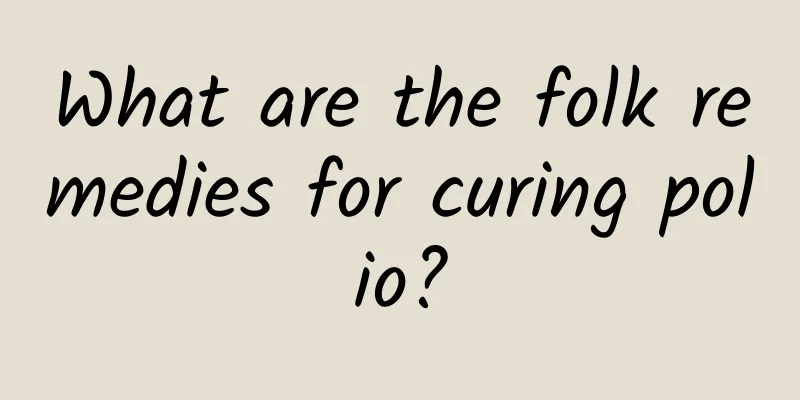Is hand, foot and mouth disease serious? Is hand, foot and mouth disease easy to treat?

|
Spring is the season when many infectious diseases are prevalent, because viruses spread faster at this time. Hand, foot and mouth disease is a very common disease, which usually occurs in spring, and mainly occurs in infants and young children. Children are easily infected when playing together. At this time, we must pay attention to prevention. Is hand, foot and mouth disease serious? Is hand, foot and mouth disease easy to treat? 1. Is hand, foot and mouth disease serious? Hand, foot and mouth disease can be very serious for children if it is not treated promptly. Since children's physical skills are not yet fully developed, their own resistance is very limited. If they accidentally get infected with hand, foot and mouth disease at this time, they should go to the hospital for targeted treatment as soon as possible, and may also need intravenous treatment when appropriate. 2. Is hand, foot and mouth disease easy to treat? Hand, foot and mouth disease is a multiple infectious disease caused by enterovirus. There are currently no specific drugs or vaccines, but parents do not need to worry as it is usually easy to cure. Hand, foot and mouth disease has a certain degree of self-healing ability and is a self-limiting disease. For most children infected with hand, foot and mouth disease, the disease course is good and the symptoms are mild. They only need to isolate and rest at home and do a good job of home care, and they can recover on their own in about a week. 3. Seek medical attention in time if the condition is serious Some children have typical and obvious symptoms after being infected with hand, foot and mouth disease, such as fever and herpes on the hands, feet and mouth, which is relatively easy to judge. However, most children have different symptoms due to different constitutions. The initial symptoms may have some non-specific symptoms, such as coughing, runny nose, or even vomiting and diarrhea, and then herpes on the hands, feet and mouth will begin to appear. At this time, parents should pay more attention and pay close attention to changes in their children's condition. If the child shows symptoms such as poor spirits, general fatigue, drowsiness, difficulty breathing, shaking or convulsions in the limbs, he or she should be sent to the hospital for treatment in time to prevent the condition from worsening and causing more serious complications such as myocarditis, meningitis, pneumonia and brainstem inflammation. Among them, brainstem inflammation is the most dangerous and may be life-threatening, so parents cannot ignore it. 4. Precautions for hand, foot and mouth disease 1. Disinfection and isolation If a child is infected with hand, foot and mouth disease, the baby must go to the hospital for treatment in time and try not to contact the outside world. In most cases, the child needs to be isolated for two weeks. Things used by children must be disinfected frequently and soaked in disinfectant containing chlorine. Things that cannot be soaked must be exposed to the sun. The child's room must maintain air circulation. Families with conditions also need to disinfect the air every day to avoid infection. 5.2. Diet and nutrition If a baby gets hand, foot and mouth disease in the summer, it is easy to have electrolyte imbalance and dehydration, and proper hydration and nutrition supplementation are necessary. The child needs to rest in bed for a week and drink more boiled water. Most children infected with hand, foot and mouth disease will have fever, poor appetite, and unwilling to eat. Therefore, you can feed your baby some light, delicious and easy-to-digest semi-liquid food, and never feed your child spicy and cold food. 6. What should not be eaten if you have hand, foot and mouth disease? 1. Avoid eating too cold or too hot food Children with hand, foot and mouth disease will develop ulcers after the herpes in the mouth breaks, which makes eating painful. The food temperature should not be too high. Eating overheated or overcold food, such as hot soup, hot pot, hot drinks, cold drinks, ice cream, iced fruit, etc., will irritate the ulcerated area and cause pain, which is not conducive to the healing of the lesions. 2. Avoid spicy food Children with hand, foot and mouth disease have herpes in their mouths that are easy to break, so they should not eat spicy food to avoid irritating the mucous membrane and aggravating the condition. They should temporarily avoid eating peppers, garlic, ginger, pepper, green onions, fried food, barbecue, and hot pot. 3. Avoid eating too salty food Children with fever and oral herpes have poor appetite and are unwilling to eat. It is advisable to feed children light, warm, delicious, easily digestible, soft liquid or semi-liquid food. Salty food, such as pickled food, salted fish, pickled vegetables, and food with strong taste, is prohibited to avoid irritating the ulcer surface and aggravating the pain and condition. 4. Avoid eating hair-raising foods The diet of patients with hand, foot and mouth disease should be light and non-irritating. They should avoid eating seafood, beef, mutton, rooster, carp, duck, goose, mango, mushrooms, bamboo shoots and other irritating foods to avoid aggravating the local rash and prolonging the course of the disease. 5. Avoid eating rough food Some parents believe that children should supplement nutrition when they are sick. In the early stages of hand, foot and mouth disease, they give their children rough and difficult-to-digest foods, such as sweet potatoes, onions, glutinous rice, bamboo shoots, etc. These foods will not only aggravate the pain in the child's mouth, but may also stimulate the child's gastrointestinal tract and affect the absorption of nutrients. |
<<: What to do if a child has a respiratory infection and coughs
>>: Baby hand, foot and mouth disease vomiting and diarrhea
Recommend
How to prevent and treat congenital heart disease in children
Many young couples feel very scared when they hea...
How to treat neonatal jaundice at home?
How to treat neonatal jaundice at home? 1. Genera...
How to treat eczema in children 3 ways to treat eczema in children
For infantile eczema, appropriate treatment optio...
Is it good to take antibiotics for pneumonia in children?
The weather changes constantly in autumn, and if ...
Neonatal jaundice is increasing
Neonatal jaundice is increasing Neonatal jaundice...
What are the effective ways to prevent tics?
Many parents of young boys see other children hav...
What can children eat when they have mumps
Children with mumps can relieve symptoms through ...
What is the normal value of neonatal jaundice?
Neonatal jaundice can be detected. Neonatal jaund...
Can people with polio do heavy work?
Polio is a relatively complicated disease. Many c...
What are the common causes of pathological jaundice?
What is pathological jaundice? What are the commo...
Can a 15-year-old still get hand, foot and mouth disease? What are the symptoms of hand, foot and mouth disease?
Hand, foot and mouth disease is a disease that is...
What measures can be taken to prevent acute non-icteric hepatitis B?
What measures can be taken to prevent acute anict...
What to do if the ductus arteriosus of the newborn is patent
Patent ductus arteriosus is a congenital heart di...
What are the examination items for breast milk diarrhea?
What are the examination items for breast milk di...
Diagnosis of late-stage renal disease in children
There are many ways to diagnose the late stage of...









